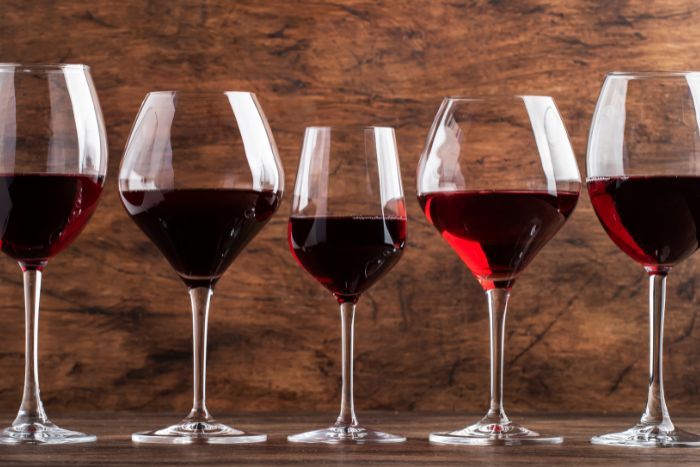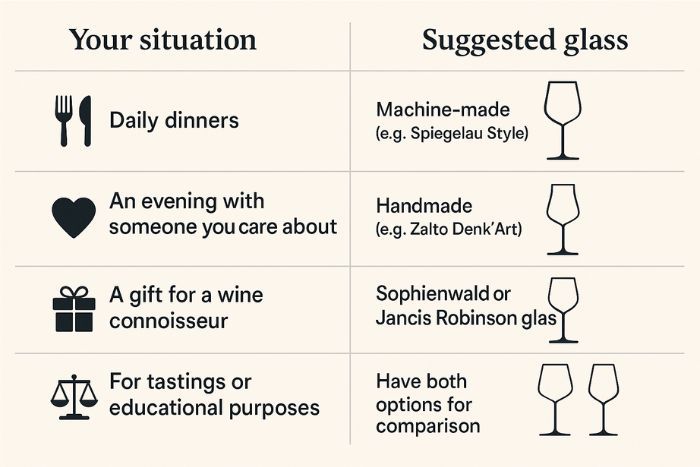Can You Taste the Difference? Handblown vs. Machine-Made Wine Glasses
Vinissimus compares handblown vs. machine-made wine glasses in terms of aroma, feel, and flavour—see which elevates your wine moments.

When you raise a glass of your favourite wine, you may not even think about whether its origin—the hand of a master craftsman or a modern machine—could influence how you feel. And yet... can the taste of wine really change depending on the glass?
The Vinissimus team believes that every detail makes a difference. So we decided to put this to the test. We organised a blind tasting with different glasses and the same wine to see where aesthetics end and true sensation begins. Read on—the results will surprise you.
Why does the glass affect the taste of wine?
A glass is not just a pretty vessel for wine. It is like a stage on which wine reveals its full beauty. It determines how the wine releases its aroma, how it interacts with the air, and even the angle at which it reaches your taste buds. Here are a few things to keep in mind:
- The shape of the glass determines how intensely you smell the aroma.
- The thickness of the walls affects temperature retention.
- Edge processing changes the contact with the lips.
- Weight and balance contribute to the overall experience.
All of this together creates not only taste, but also atmosphere. Because wine is more than just a drink. It is a moment, a story, an emotion.
Handcrafted glasses: subtlety and emotion
When you hold a handcrafted glass, you feel something more than just a glass object. It is the result of craftsmanship – each glass is blown individually, without seams, with incredible lightness.
Due to the extremely thin walls, the wine seems to float in the air. And when it touches your lips, the sensation becomes almost immaterial.
Such glasses not only improve the aroma diffusion, but also strengthen the connection with the wine itself. Every sip becomes a festive gesture. However, they are not suitable for everything.
Handmade glasses:
- usually cost more (€30–70 per unit),
- are more fragile,
- not dishwasher safe.
Therefore, they are more often chosen by those for whom wine is not an everyday habit, but a ritual, an experience in which every detail is important.

Machine-made glasses: reliable everyday use
Today's industrial glasses are a far cry from the heavy, clunky designs of the past. Modern manufacturers such as Riedel and Spiegelau can create glasses that look elegant, are comfortable to hold, and in some cases are even light enough to be mistaken for handmade.
These glasses are usually uniform in shape, more durable, and much more practical—ideal for parties, restaurants, or just a simple Tuesday with a glass of Garnacha. Most importantly, they are affordable, dishwasher safe, and easy to replace if broken.
Of course, they may have slightly thicker edges and don't have the same "wow" effect as the handmade version. But for many, this is a compromise that works perfectly well.
The Vinissimus test: can we really taste the difference?
To make sure that the difference could be felt not only in theory, we organised a blind tasting. Ten participants—ranging from complete beginners to experienced wine lovers—tasted the same wine from two different glasses: one handmade, the other industrial.
Tasting results:
- 8 out of 10 recognised the handmade glasses by contact with their lips.
- Six out of ten said that the wine sounded clearer and breathed more freely in the handcrafted glass.
- The difference became clearer to the participants only after they learned which glass was which—meaning that the psychological aspect is also important.
Experts said that the white Albariño from Rías Baixas showed up really well in a delicate, thin glass. Meanwhile, the rich Priorat Garnacha had less contrast—its structure let it come across as strong even in a simpler glass.
Recommendations based on your style
When choosing glasses, think not only about the wine, but also about yourself. How intense is your relationship with wine? Here are a few guidelines:

So, is it worth it?
In short: if you can, yes. A handmade glass is like a good vinyl record – it sounds different, even if the difference is difficult to describe in words. It creates an atmosphere that invites you to stop and listen.
However, a good industrial glass also has its place – it is reliable, practical, and allows you to enjoy wine without any worries. Our advice? Have both. One for the heart. The other for the mind.
FAQs
What types of wine glasses are there?
There are specific glasses for red, white, sparkling and dessert wines, each designed to highlight the characteristics of the wine.
Why is the size and shape of the glass important?
The shape and size influence the oxygenation and the perception of aromas and flavours of the wine.
Can wine glasses be washed in the dishwasher?
Some glasses are dishwasher safe, but hand washing is recommended to avoid damage and to preserve their shine.
What is the best way to hold a wine glass?
It should be held by the stem to avoid heating the wine and leaving marks on the goblet.
Which material is better for wine glasses: crystal or glass?
Crystal is preferred for its clarity and delicacy, although glass is more resistant and economical.
How much wine should be served in a glass?
Ideally, only one-third of the glass should be filled, allowing the wine to breathe and its aromas to be better appreciated.
How to clean difficult stains on wine glasses?
Use warm water, a little white vinegar and a soft cloth to remove stains without damaging the glass.
Is it necessary to have different glasses for different wines?
It is not essential, but using the right glass enhances the experience and taste of each type of wine.
__________________
You may also be interested in:
- Which Wine Glass to Use
- Would you pay £1,000 for a glass of wine
- How many glasses of wine in a bottle?
- Wine Etiquette: Dos and Don'ts
- How to Host a Perfect Home Wine Tasting Party